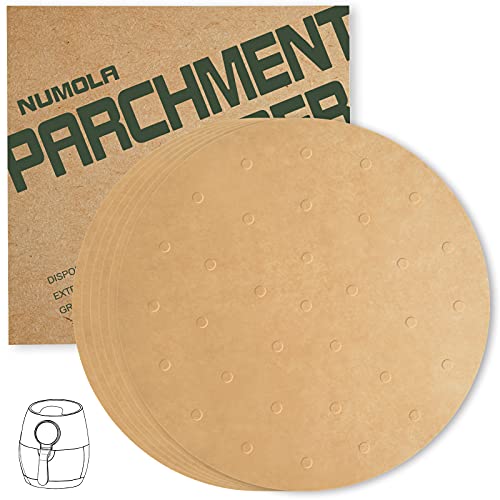Ready to spice up dinner? This air fryer salsa verde equals compliments at the dinner table. It tastes so fresh and tangy from the tomatillos, plus you control the heat!

Do you love your air fryer as much as I do? I use mine almost everyday. You really need to give air fryer salsa verde recipe a try! You’ll be amazed at how incredibly easy it is to whip up, and who knows, it might just become a favorite in your list of whole food plant based air fryer recipes.
What are tomatillos?
At first look you might think that this is made with little green tomatoes, but tomatillos are actually related to gooseberries and ground cherries.
Once you remove the husk, that’s when it looks like a green tomato. But when you cut into it you will see a huge difference. A tomatillo is much denser inside and doesn’t ooze like a cut tomato does.
What do tomatillos taste like?
The are very tangy and can add a higher note to sauces. Do note that larger tomatillos can bring some bitter flavor to your dish, so keep that in mind when you are choosing them.
Ready to go ahead and give this air fryer salsa a try? Here’s answering some questions that might be buzzing in your mind.Where can I find tomatillos?
The best place to look is in your local Hispanic market. You will find the freshest and least expensive ones there.
You can get them in most supermarkets and Whole Foods in the produce section too.
How long will my salsa verde last?
This tomatillo salsa verde can easily last for up to a month in your freezer, which makes it a great recipe to batch make and store for later. You can also pop it in the fridge and it’ll stay good in there for up to 7 to 10 days.
If you tend to purchase bottled salsa, they definitely last longer. This one is homemade, healthy and free from preservatives, making it a better choice for you and your family.
To increase the shelf life of your salsa verde, you can also add in a teaspoon of apple cider vinegar.

How can I tell if my salsa went bad?
One of the most obvious signs that your salsa has gone bad is that you’ll notice mold or other strange looking growth on the edges or on the surface of the container the salsa is in.
Also check for any foul odor, color changes, textural changes and if you notice one or more of these, it might be time to throw it away. It’s better to be safe than sorry!
It is important to remember that salsa, regardless of whether it is homemade or store bought, can go bad quickly if you leave it out of the refrigerator for too long once you’ve opened it.
Another aspect to keep in mind to help your salsa stay fresh for a longer period of time is to always use a clean, dry spoon to pour out the salsa from the container, and put the lid back on and get it back into the fridge as soon as you’re done using it.

Why is my salsa verde bitter sometimes but not others?
Charring the tomatillos is an important step when it comes to making this air fryer salsa verde. If the tomatillos are not cooked through, they’ll leave an intense tart and sour taste. Remember that they’re basically giant sour gooseberries.
Make sure you cook them nicely in your air fryer basket as the recipe suggests, and you should be set.
Also if you use large tomatillos they are more bitter than the small ones, so choose unblemished smaller tomatillos when you have the option.

What does air fryer salsa verde go with?
This salsa verde is an excellent no oil air fryer recipe, and is super versatile too! You can team it up with so many snacks and recipes.
This salsa tastes great with my Slow Cooker Lentil Quinoa Taco Filling. And if you’re in the mood for some Mexican food for dinner, give these Vegan Chimichangas a shot- they taste amazing with this salsa verde!
It’s also great on my Air Fried Tofu Rancheros with Veggies, Seitan Chimichurri Tacos, and it makes Dora’s Potato Adobo Tamales taste even better!

Easy Air Fryer Salsa Verde
There is no flavor match to the tanginess of tomatillos. They look like little green tomatoes covered in a husk, but they have a flair of their own. Once you try this roasted tomatillo salsa, you’ll never buy store-bought again. It’s ridiculously easy, and you can adjust the heat to suit your family’s taste.
Ingredients
- 4 large or 8 small tomatillos, cut into sixths
- 1 medium onion, cut in half and sliced thick
- 1 small jalapeño, seeds and stem removed
- 3 whole cloves garlic, cut in half
- Juice of 1 lime
- ¼ cup cilantro, include the stems
- salt, to taste (for no salt people I'd just skip)
Instructions
- Add the tomatillos, onion, jalapeño, and garlic to your air fryer basket and cook at 400 degrees for about 10 minutes.
- Shake the basket 1 to 2 times during the cooking process to keep the cooking even.
- Add the cooked mixture to your blender with the lime juice and cilantro. You can blend smooth or leave it chunky.
Recommended Products
As an Amazon Associate and member of other affiliate programs, I earn from qualifying purchases.
Nutrition Information
Yield 16 Serving Size 1Amount Per Serving Calories 10Total Fat 0gSaturated Fat 0gTrans Fat 0gUnsaturated Fat 0gCholesterol 0mgSodium 37mgCarbohydrates 2gFiber 0gSugar 1gProtein 0g
Nutrition information is provided from nutritionix.com as a close estimate. If you have specific health issues please put the recipe information, including the exact ingredients you use, into the nutritional calculator your Dr. recommends.




Dina says
Air frying tomatillo? What a great idea! Thank you! I just love ❤️ Green salsa!
Donna says
Hi Kathy, my neighbor gave me a #10 can of tomatillos. I’m wondering if I can make salsa with it since it’s already cooked? Maybe can it or I can freeze it. I don’t know what else to do with it, any suggestions will be appreciated.
Kim says
This is a truly ingenious recipe. So simple, and it tastes great!